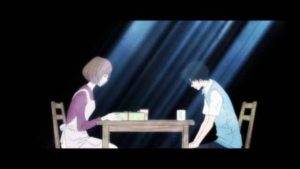3-gatsu no Lion has just finished its 2nd season (on that notes, rest assured that Wooper will cover it till the end of this season and I’ll chime in to give a full post). After Burnt Field mini-arc – which was a solid arc by all means – it came rather natural that the last few episodes focus more on low-key drama instead of focus on another arc. All the better in my opinions since these last episodes elevate Hinata as one of the best girl on Earth and one side chapter that hit me hard on a personal level. So much that despite my laptop is currently broken and I still have two full reviews to write (that’ll come, I promise), I just wanna let this all out first. Keep in mind this is not a review, nor does this reflection piece have any point to make; just merely what I feel about it.
Consider how the second season ends in a satisfying note, I was quite surprised the show follows very closely to the manga’s structure, with only one chapter was adapted out of its order, and that chapter was “Other Home”, and for me it’s probably the best choice that Shaft made. Other Home sheds some more light to the crippled relationships and between him and the family members and the breakdown of the family. The trick here is the shift of perspective. This chapter gives a voice to the voiceless member of the his foster family. Damnit it’s such a brilliant character study in display here. The first notion that really grabs me personally is how this family represents accurately the family dynamic of Asian culture (East Asia to be more specific), so much so that it reminds me a great deal of my own and the one that the more I grow apart from it, the more I can look at it with different perspective. We have a Father who decides the best method to teach his own kids how to face their problem is to smirk “haha” and does nothing. We have a Wife who does housework everyday, stands there in the kitchen making dinner and wait for her husband and kids come home, even without anyone contact her. We have a Mother who constantly blames herself for raising her kids the wrong way, as if the way they turn out HAS ANYTHING TO DO with the way she raises them. And we have the only one member that tries her best to hold everything together since everyone else just stuck up in their own little worlds.
The framing device is pretty on point as well. We don’t hear any conversation between her and Rei, as if their conversation is just merely a facade, the mask that both of them put on. Throughout the chapter we rarely see her face, we see mostly behind her back, when she’s busy doing housework. Those motifs match with the way she smiles, and all the formal lines she about to say, but holds back. Here they sit, opposite to each other, afraid to look at each other’s eyes, and words come out their mouth are pointless. The home that never feels like a home. And it certainly shreds my heart when I realize that the only member Rei feels like his real family is their old dog.
And that comes to another brilliant part of this chapter, the chemistry (or the lack thereof) between Rei and her. I am always find one of the most intriguing relationship is the one like this. The one that always rely on other factors to work, and then when you pull these factors out of the equation, what’s left between them? From her perspective, her husband just agrees to bring another boy to live as a family, so what she’d do best is to support him. Then she sees her own children crumbled right before her eyes because of the presence of that boy, and the family keeps falling apart beyond her hands. Underneath all that she knows it all and she knows that Rei understands it too. What kind of emotions and what kind of behaviour will she act when she meets Rei alone, then? I love it that she has a dream that night that Rei were her own child. That maybe the closest distance that she ever regards him to be.

